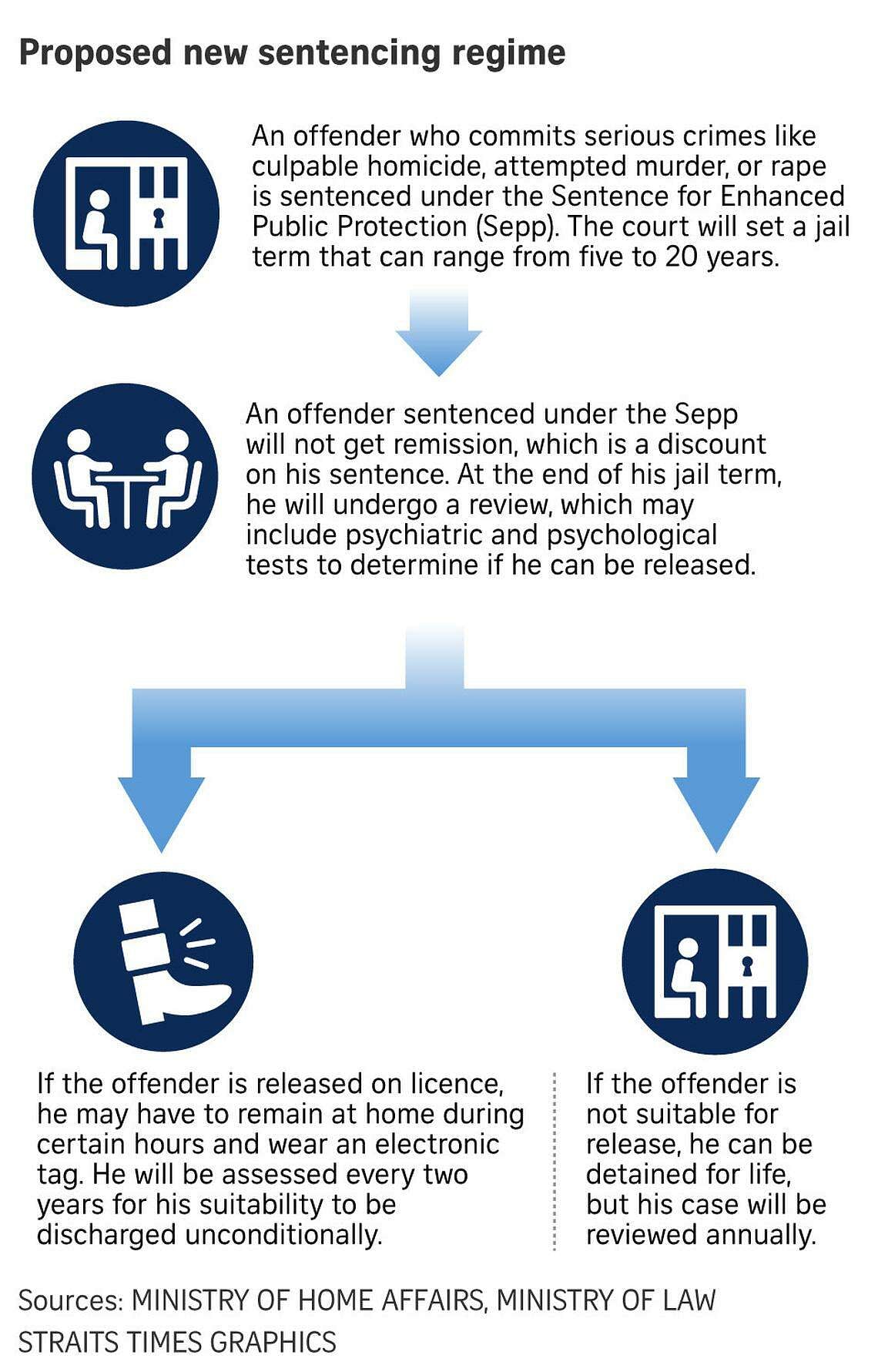SINGAPORE - In spite of their long jail terms for committing heinous sex offences, some former inmates reoffended after being released from prison.
To protect the public from such criminals – even those who are first-time offenders of serious sexual and violent crimes – a new sentencing regime was introduced in Parliament on Jan 10.
Called the Sentence for Enhanced Public Protection (Sepp), it was introduced as part of the Criminal Procedure (Miscellaneous Amendments) Bill.
It is to prevent dangerous offenders from being automatically released from prison after their jail terms end, especially if they show signs of reoffending.
Speaking to the media at the briefing on the Bill, Law and Home Affairs Minister K. Shanmugam said: “In Singapore, what we have seen is people who prey on young girls – may not necessarily be rape. They come out, and then they do it again.”
In a joint statement, the Ministry of Law (MinLaw) and Ministry of Home Affairs (MHA) said that with current sentencing options being inadequate to deal with such serious offences, Sepp will ensure serious offenders are detained for as long as is needed for public safety.
Sepp is limited to those who commit serious violent offences such as culpable homicide and attempted murder, and serious sexual offences such as rape and sexual penetration of a minor.
In response to queries from The Straits Times, the two ministries said there are currently 200 to 300 cases each year of serious violent and serious sexual offences.
Sepp will apply to those aged 21 and above, and will not just be for recalcitrant offenders but for first-time offenders as well.
If sentenced under Sepp, an offender can be detained for between five and 20 years. He will not get remission, which is a discount on his sentence.
At the end of his term, if the offender is found suitable to leave prison, he will be released on licence.
This means he may be required to attend counselling, remain at home during certain hours, and wear an electronic tag. He will be assessed every two years for his suitability to be discharged unconditionally.
If an offender is not suitable for release, he can continue to be detained indefinitely and even up to life. But his case will be reviewed annually.
Mr Shanmugam added: “There will be a proper assessment. Is he mentally and psychologically fit to be released, or is he going to continue to be a menace to society? If he continues to be a menace to society, he can be kept in.”
The assessment of an offender’s suitability for release takes into consideration his conduct in prison, his rehabilitation progress and the likelihood of reoffending, among other factors. The assessment will also include psychological and psychiatric tests, said MinLaw and MHA.
The length of time taken for an offender’s review will depend on the specific circumstances of his case, added the ministries.
Sepp is unlike an imprisonment sentence or preventive detention, where the offender must be released after serving the sentence imposed by the court.
Preventive detention is a regime for recalcitrant offenders that does not automatically offer the usual one-third remission.
In 2018, a man, 59, sexually assaulted his stepdaughter when she was 12, less than two years after he was released from jail for raping his 11-year-old niece.
He was given the maximum 20 years’ preventive detention in 2020 for assaulting his stepdaughter. For raping his niece, he was sentenced to 24 years’ jail and 24 strokes of the cane in 2001.
In 2022, a diagnosed paedophile, who sexually assaulted his two grandnieces less than three years after serving a lengthy prison term for raping his stepdaughter, was sentenced to the maximum 20 years’ preventive detention.
It is hoped that Sepp will prevent people like them from being released after completing their sentences, if they show signs of reoffending.
MinLaw and MHA said the authorities want to ensure that dangerous and high-risk offenders are not released into the community until they no longer pose a threat to public safety.
They noted that for offences that do not call for life imprisonment, the available sentencing options all require offenders to be released automatically after a certain point, regardless of the threat they pose to others.
It will be up to the court to decide if Sepp is appropriate for the offender after considering risk assessment reports, including reports by the Institute of Mental Health (IMH).
Separately, if the Bill is passed, the corrective training regime will be repealed and the preventive detention regime will be amended.
To replace the existing sentences of corrective training and preventive detention, the Sentence for Public Protection (SPP), which is aimed at recalcitrant offenders, will be introduced.
Currently, the corrective training regime applies to offenders aged 18 and above who require it for a substantial period. This is followed by supervision if they are released before their sentence ends, to prevent them from reoffending.

The preventive detention regime applies to offenders aged 30 and above who need to be detained for a substantial period. It is reserved for more serious offenders, compared with the corrective training regime.
MinLaw and MHA said that between 2015 and the third quarter of 2023, there were 268 offenders who were sentenced to corrective training and preventive detention in total, which averages out to about 30 offenders a year.
If the Bill is passed, the SPP will be for those aged 21 and above, and they can be jailed for between five and 20 years.
They may be released on licence by the minister for home affairs after serving two-thirds of their sentence and must be released after serving the full term.
Serious sex abuse cases
1. Man raped cousin’s sons
An offender who raped and sexually assaulted six boys was sentenced to 40 years’ imprisonment and 24 strokes of the cane in September 2023. He preyed on underage relatives and on boys he had met in the neighbourhood. The man took two of his cousin’s sons to the toilet to abuse them together and made them perform sex acts on each other. An IMH report found that he had a paedophilic disorder and was a menace to society.
2. Teaching assistant abused 11 boys
In August 2022, a man was sentenced to 42 years’ jail and 24 strokes of the cane after admitting to six charges of aggravated sexual assault by penetration of four victims between nine and 11 years old. He was a teaching assistant at an after-school care centre and had systematically groomed and sexually abused 11 boys over a seven-year period. After his arrest, he was diagnosed with a paedophilic disorder and assessed to pose a moderate to high risk of reoffending.
3. Tutor abused eight special needs children
A man who sexually abused eight children with learning or physical disabilities after offering to tutor them was jailed for 45 years in June 2022. Two of the victims were five years old, while the third was eight. He recorded videos of the assaults and was assessed to be at very high risk of repeat sexual offending against young female victims.
4. Man abused four of his daughters
A man who sexually abused four of his five daughters and raped three of them was jailed for 33 years and two months and given 24 strokes of the cane in March 2022. He began sexually assaulting his eldest daughter in 2004 when she was around six years old and then abused the others over the years. One of them lodged a police report. The High Court judge called this case one of the worst cases of rape and sexual assault.


